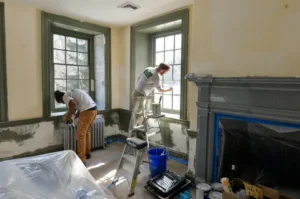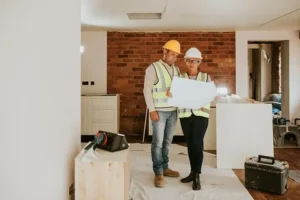Typical Renovation Errors to Prevent
Although home remodeling projects can be thrilling, there are many risks involved. Avoiding common renovation mistakes can save you time, money, and frustration, whether you’re rebuilding a bathroom, updating the cooking area, or giving your entire house a new look. We’ll go over the most common mistakes homeowners make when renovating in this guide and how to steer clear of them for a smoother and effective renovation.

“Typical Renovation Errors to Prevent—Learn how to avoid costly mistakes during your renovation journey.”
Not Making a Good Renovation Plan Before Remodelling
Starting a renovation project without a thorough and well-defined plan is one of the most common mistakes made by homeowners. Demolition can go awry if you start without a scope of work, blueprints, or sketches. Effective planning consists of:
defining unique renovation plans.
make a realistic schedule.
describing the specific steps for every stage.
putting together an honest price range.
Neglecting planning will inevitably lead to unexpected delays and cost overruns. A thorough renovation plan should always be created before any work is done.
Ignoring Financial Restraints During Renovation
Renovations frequently end up costing more than expected. A lot of homeowners undervalue the cost of labor, materials, and permits. Setting a budget for just the big things and ignoring the smaller but equally important expenses like fixtures, materials, and finishes is a common error.
Preventing Commercial Strain in Your Renovation Project:
At least fifteen percent to twenty percent of your budget should go to a contingency fund.
Obtain several quotes from different contractors.
Keep tabs on costs during the project.
One of the quickest ways to ruin a home renovation project is to ignore financial constraints.

“Preventing Commercial Strain in Your Renovation Project – Smart budgeting ensures a stress-free renovation experience.”
Ignoring Required Licenses and Rules in renovation
Skipping permits in an attempt to save time or money could result in costly consequences. Municipalities frequently require permits for major renovations, structural alterations, plumbing, and electrical work. Failure to obtain them could lead to penalties, compelled rework, or issues when reselling.
Always inquire about required permits from your local building authority. Employing certified experts guarantees that all work conforms to safety standards and laws.
Choose the Wrong Contractor for your renovation
Hiring the wrong contractor can ruin an entire renovation project. Inadequate screening of contractors by homeowners frequently results in subpar work, late payments, and budget price increases.
When choosing a contractor:
Verify insurance and licenses.
Examine references and reviews.
Examine the portfolios of prior projects.
Make a thorough contract that specifies deadlines, roles, and terms of payment.
Keep in mind that the best option isn’t always the lowest bid.
Making Use of Poor-Quality Materials in Renovation
Choosing inferior, less expensive materials in an attempt to save money frequently backfires. Low-quality materials can deteriorate rapidly, necessitating expensive replacements. Whether it’s paint, flooring, or fixtures, making an investment in long-lasting materials guarantees satisfaction and value over time.
By selecting better materials up front, you can avoid needless upkeep and repairs down the road.
Ignoring the Unexpected in a renovation project
Surprises frequently occur during renovations, regardless of how well you plan. Opening walls often reveals hidden mold, old wiring, or structural problems. Homeowners often make the mistake of not anticipating these problems.
Set aside additional funds and time to deal with unforeseen issues. Your renovation plan should be flexible so that you can deal with unforeseen circumstances without becoming overly stressed.
Ineffective Space Planning in Renovation
Ignoring functional space planning is a common design error. Sometimes homeowners prioritize aesthetics over usability, flow, and storage. For instance:
putting kitchen islands in proximity to cabinets.
designing restrooms with inadequate ventilation.
disregarding window placement and natural light.
To make sure the renovation improves both form and function, work with an experienced architect.
Taking on Too Much Home Improvement Work
Although do-it-yourself projects can yield great rewards, undertaking intricate renovations without the necessary expertise can lead to serious issues. Structural, plumbing, and electrical work require experience. Making a mistake in this area could result in costly and dangerous consequences.
You can handle smaller projects such as painting, decorating, and landscaping, but delegate important work to professionals. Understanding your boundaries reduces safety hazards, time, and expense.

“Taking on Too Much Home Improvement Work: Avoid burnout by planning realistic renovation goals.”
Neglecting Energy Efficiency During Renovation
Only following the latest trends when renovating can result in regret. Future needs like expanding families, aging-in-place features, or resale value are frequently disregarded by homeowners.
When choosing a design, consider the long term. Choose timeless designs and practical layouts that will sustain your lifestyle for an extended period.
Missing Effective Lighting
Often overlooked during renovations, lighting significantly shapes the appearance and feel of a room. Even the most exquisite designs can appear drab and unusable in poorly lit spaces.
Your renovation plan should include a combination of task, ambient, and accent lighting. To improve both usability and aesthetics, take into account energy-efficient fixtures and natural light sources.
Picking Up the Renovation Schedule
Choosing an impractical timeline is another error. Many homeowners pressure contractors to expedite the work because they want the project completed as soon as possible. This mistake frequently results in subpar workmanship and forgotten details.
Give each step—planning, obtaining a permit, building, and finishing touches—enough time. A well-paced project guarantees improved outcomes and fewer errors.
Not Finding in Dealing with Contractors
It’s critical to communicate clearly with your contractor. Disputes frequently result from misunderstandings regarding budgets, deadlines, or design details. Many homeowners experience disappointment when they assume their contractors fully comprehend their expectations.
Plan frequent check-ins, pose inquiries, and regularly assess your progress. Effective communication fosters trust and avoids expensive mistakes.
Not Keeping Your House Safe While Remodelling
Projects involving renovations produce dust, debris, and possible harm to nearby areas. Homeowners frequently fail to safeguard valuables, flooring, and furniture.
Before commencing work, ensure the removal of fragile objects, conceal the construction areas, and apply protective coverings. Damage and cleanup are reduced with careful planning.
Neglecting Energy Efficiency
Not including energy-efficient features during renovations is a lost opportunity. Higher utility costs and less comfort can result from neglecting windows, insulation, and energy-saving appliances.
Install contemporary HVAC systems, upgrade insulation, and select energy-efficient windows. This will raise the value of the property in addition to saving money.

“Neglecting Energy Efficiency: Don’t miss the chance to save energy and money during your renovation.”
In conclusion
Although they can transform your living space, home renovations are not without their challenges. You can get a smoother, more satisfying result by avoiding common renovation mistakes like inadequate planning, disregarding budgets, selecting unqualified contractors, or rushing timelines. Flexibility, meticulous planning, and attention to detail are the keys to success.
Renovating your home is about creating a space that works well, adds value, and suits your lifestyle, not just about improving its appearance. You will appreciate the process and the outcomes for many years to come if you take the time to plan, make quality investments, and foresee obstacles carefully.
FAQs:
1. How can I renovate for less money without compromising quality?
By doing small do-it-yourself projects, reusing existing fixtures when feasible, and shopping around for materials, you can save money. But don’t skimp on important projects like structural upgrades, electrical work, or plumbing.
2. What is the most frequent error homeowners make when renovating their homes?
Poor planning, frequently combined with unrealistic budgeting, is the most frequent error. Projects that lack a clear plan frequently go over budget and schedule.
3. Should I oversee the renovation myself or hire a contractor?
Hiring a professional contractor is crucial if the renovation calls for significant structural, plumbing, or electrical work. You should handle only minor cosmetic changes.
4. How much money should I set aside for unforeseen expenses?
For unanticipated problems, experts advise allocating 15–20% of your overall renovation budget.
5. What factors should I take into account when selecting materials for my renovation?
Quality and longevity should always come before initial savings. Instead of choosing fads that might disappear, choose classic materials that will last.

